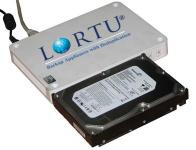| ||||||||||
| Microsemi reports shake
rattle and roll SSD results Editor:- May 19, 2011 - Microsemi today announced that its TRRUST-STOR (2.5" rugged SSDs) are the industry's first SSDs to pass zero-failure testing at vibration levels that are consistent with the industry's most severe environments. "No other SSD manufacturers have published zero-failure results at this level of vibration testing, which was conducted while our drives were fully operational, reading and writing data," said Jack Bogdanski, director of marketing for Microsemi. "The ability for SSDs to perform flawlessly under adverse environmental conditions is becoming increasingly important for applications where it is critical that data be protected at all times." Microsemi's SSD units were pre-conditioned at 85°C for 336 hours. See also:- industrial SSDs, military storage Dataram talks about blurring memory and storage Editor:- May 19, 2011 - Dataram's Chief Technologist Jason Caulkins has written a new blog - Memory and Storage Technologies Begin to Blur in which he says new nv memories may render legacy hard disk interfaces obsolete by enabling most storage to fit in servers. Jason is no stranger to this concept having designed a PCI SSD - called the Rocket Drive 10 years ago. But Dataram's current SSD appliance is very much a fibre-channel SAN animal - designed to work alongside legacy installed RAID arrays. Jason says in his blog the key enabler to these new architectures will be software. My own view is that legacy hard disk DAS and NAS storage interfaces will continue to inter-operate with PCIe SSDs (and new faster SSD interfaces) even in a totally solid state world. I think storage in a complex enterprise will always be heirarchical - because different types of SSD will be optimized for different functions - and it won't be economic to use a one type fits all deployment. See also:- how will Memory Channel SSDs impact PCIe SSDs? the flash SSD story - survival of the fittest? Editor:- May 19, 2011 - StorageSearch.com published a new article today called - SSD's past phantom demons. The emerging size of the flash SSD market as you see it today wasn't inevitable. It owes a lot to 3 competing storage media competitors which failed to evolve fast enough in the Darwinian jungle of the storage market in the past decade. One of these 3 contenders is definitely on the road to extinction - but could one of the other 2 still emerge to threaten flash SSDs? ...read the article Texas Memory Systems launches very fast PCIe SSD Editor:- May 17, 2011 - Texas Memory Systems unveiled imminent availability of a new fast PCIe SSD - the RamSan-70 - a 900GB (SLC) 1/2 length card with upto 330K / 160K R/W IOPS and upto 2GB/s throughput. Editor's comments:- I spoke to Jamon Bowen, Director of Sales Engineering for TMS and learned more about the new SSD. My first comment was that it's long overdue - because TMS launched their classic RamSan-20 - 26 months ago. Jamon said that TMS has learned a lot about the PCIe SSD market since then - both as feedback from their customers and also from analyzing the successes and failures of the many other companies which have entered this market space in the intervening period. The most important things about the RamSan-70 are:-
| ||||||||||
|
| ||||||||||
| ||||||||||
|
| ||||||||||
| SanDisk gets serious about
enterprise SSDs Editor:- May 16, 2011 - SanDisk announced a definitive agreement to acquire Pliant Technology for approximately $327 million. Editor's comments:- I had some time ago made these strong comments in the profile pages of the respective companies. "As I see it Pliant's current business model is not sustainable as it has a very narrow channel into the enterprise SSD market which can easily be choked off by slot substitution." and "Despite occasional talk about "enterprise SSDs" - SanDisk is culturally rooted in the consumer electronics market. That's a very competitive market in which few companies are making profits." This acquisition theoretically fixes complimentary strategic weaknesses for both companies:- no customers (Pliant) and no enterprise IP (SanDisk). Looking back at SSD market history -5 years ago tossed away a viable foothold in enterprise SSD technology which had been established by an earlier acquired company M-Systems - preferring to focus instead on its MLC flash patents and IP. Looking forward Pliant's SSD controller will enable SanDisk to enter fast growing markets without having to join the SandForce inside set. OCZ samples new SAS SSD Editor:- May 15, 2011 - OCZ is sampling a new 3.5" SAS SSD in its Talos family. The new product has upto 960GB MLC capacity and upto 60K IOPS. | ||||||||||
 | ||||||||||




